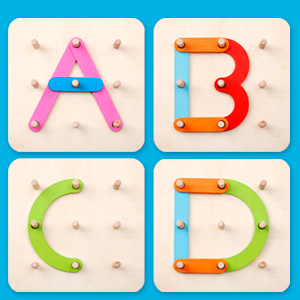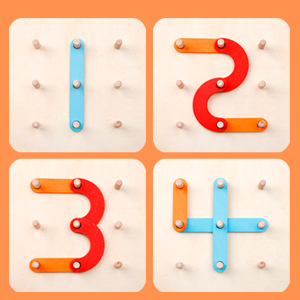Math development in toddlers begins far earlier than most parents realize. From the moment you start saying things like "one candy" or "two socks," you are already launching your child on a lifelong math journey. Early exposure to math concepts builds a strong foundation, making future learning easier and more intuitive.
We tend to associate math with school, but in reality, math learning starts at home, during everyday activities like counting objects, sorting shapes, and recognizing patterns. Whether it's counting spoons at the dinner table or spotting shapes during a walk, these daily interactions help toddlers develop early math skills in a natural and fun way.
Why Start Math Early?
Starting math early matters because a toddler’s brain is highly receptive to learning. Between ages 0 and 6, children go through their most intense period of development, with their brains rapidly forming connections. Just like early exposure to music or language can lead to better results, early math experiences create a positive relationship with numbers and problem-solving.
Parents can introduce math without any formal lessons. Words like "first and second," "bigger and smaller," or "more and less" build a child’s mathematical vocabulary. Everyday activities such as counting cars, reading numbers on price tags, or identifying shapes around the house foster early math skills in a playful manner.
Making Math Fun and Engaging
One of the keys to successful math development is keeping it fun and engaging. Here are some simple, enjoyable activities:
- Counting Objects: Encourage your toddler to count toys, fruits, or anything they play with during the day.
- Sorting Games: Ask them to sort items by size, shape, or color, which enhances logical thinking and categorization skills.
- Recognizing Patterns: Help them spot repeating patterns in daily life, such as stripes on clothing or tiles on the floor.
- Math Through Play: Use building blocks, puzzles, or board games to introduce math concepts in a stress-free way. Recommended to you Wooden Letter Number Construction Puzzle This puzzle integrates counting, shape recognition, and color identification into play.



Singing number songs, playing hide-and-seek with a counting element, or involving your child in baking (measuring ingredients) are additional fun ways to develop math skills.
How to Support Without Pressure
While it’s important to encourage math development, it’s equally critical to avoid pressure. Keep activities light, playful, and aligned with your child’s interests. Celebrate small accomplishments and provide positive reinforcement to maintain their motivation. Building a supportive environment helps your child see math as an exciting challenge rather than a source of stress.
What If I Missed the Early Window?
If your child is already in school and struggling with math, don’t worry—it’s never too late. While earlier is better, success can still be achieved at any age. The key is to focus on motivation and help your child change negative habits. Encourage them to understand concepts rather than memorize answers. With consistent support and patience, you can help them catch up.
Using Technology to Enhance Math Learning
Technology can be a powerful tool to support your toddler’s math development. Age-appropriate educational apps and games can introduce counting, sorting, and problem-solving in an interactive way. However, it’s essential to monitor screen time and ensure the content is suitable for young learners.
Final Thoughts
Math development begins the moment a child starts observing the world around them. By introducing simple math concepts early and making learning fun, parents can give their toddlers a head start in building critical thinking and problem-solving skills. Whether through playful activities, everyday conversations, or educational apps, fostering a positive attitude toward math can lead to long-term success.
Remember, it’s not about formal teaching or complex lessons—it’s about creating an environment where math feels like a natural part of life. So, start early, keep it light, and watch your child’s math skills grow!





























